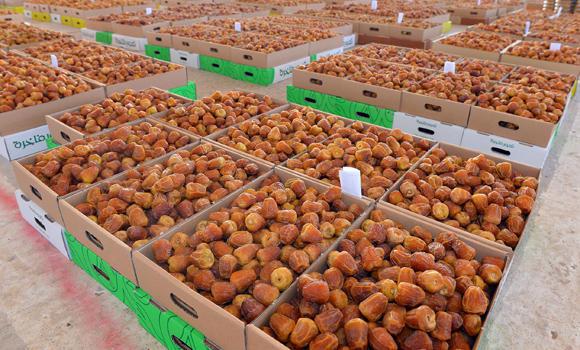
Buraidah, Aug 30: Abdul Aziz Al-Twaijri, a member of the National Council for Palms and Dates, has alleged that huge quantities of Saudi dates are being sold in European markets with a “country of origin” label other than that of Saudi Arabia.
Speaking on the sidelines of Buraidah Dates Festival, Al-Twaijri said the Saudi produce was being accessed to Asian and European markets through neighboring countries such as UAE, Jordan and Turkey.
He said that the UAE had become a gateway for Saudi dates to East Asian countries, while Turkey had opened the gates to European markets and Jordan opened several outlets to other countries. “Europeans normally prefer dark brown dates, which are priced between SR 20 to SR 50 a kg,” Al-Twaijri said, noting that East Asian countries are more price-conscious than concerned with quality and prefer dates priced at not more than SR 15 per kg.
He said: “A single riyal is added to every extra kg for transporting the commodity to neighboring countries such as Yemen, Jordan, the Gulf States and Egypt. But transportation by sea is more expensive, with SR 5 added to a kg of dates. Taxes and transportation costs are included.”
Ten percent of local dates production is dispensed as government subsidies, which corresponds to up to 2.5 percent of production volumes, said Al-Twaijri adding: “Another 7.3 percent is dispensed as subsidies for the less fortunate throughout the world, with Somalia and Yemen topping the list, as well as refugee camps in Turkey, Jordan and Lebanon.”
“There are 12 outlets for hosting Saudi date distribution throughout the globe, including the SAIL exhibitions in Paris, 'ANOVA' in Germany and 'Halal' in Malaysia, in addition to several other exhibitions around the world,” explained Al-Twaijri.
Sultan Al-Thunayan, head of the Dates Committee at the Qassim Chamber of Commerce, said that Saudi dates are of high quality. “The Buraidah Dates Festival has opened the doors to international markets,” he added.
There is in excess of 22 million trees in Saudi Arabia, he said, adding that these trees produce more than 1.2 million tons of the fruit, of which Qassim only produces 20 percent.






Comments
Add new comment